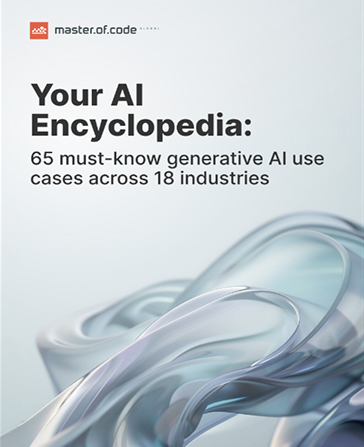As a pivotal innovation in hospitality, hotel chatbots are changing the game for guest services. A significant 76.9% of customers now show a preference for amenities that utilize bots for client care. These digital tools transform business operations, enhance visitor engagement, and streamline administrative tasks.

Dive into this article to explore the revolutionary impact of AI assistants on the sector. Uncover their unique benefits, versatile applications, and future trends. Taking into account major pain points you face, we’ll demonstrate how integrating a chatbot in the hotel industry can elevate your service quality and client satisfaction to new heights.
Table of Contents
Driving Guest Satisfaction: The Multifaceted Benefits of Hotel Chatbots
In the realm of hospitality, the adoption of digital assistants has marked a significant shift towards enhancing travelers’ experiences. Oracle highlights the importance of comfort, control, and convenience – key elements in modern customer support solutions.
Being an integral part of this technological advancement, hotel chatbots present a range of advantages including:
-
- Increased guest engagement and interaction. Bots offer dynamic communication channels, tailoring user journeys to their individual preferences. This way, the technology enables more personalized and memorable client interactions.
- Reduced response time for guest inquiries. The tools guarantee immediate replies, greatly reducing waiting periods. This rapid service significantly enhances overall consumer satisfaction.
- Enhanced accuracy and consistency in information delivery. Providing uniform and accurate facts, the solutions eliminate discrepancies in client conversations. They ensure reliable and uninterrupted data provision to every visitor.
- Cost-effective customer service solution. Chatbots automate routine inquiries, addressing staffing needs while lowering operational costs. Their efficient aid optimizes resource allocation, upgrading overall support operations.
- Data-driven insights for client care improvement. By analyzing interactions, bots identify business enhancement opportunities. These findings lead to more tailored and result-oriented guest assistance strategies.
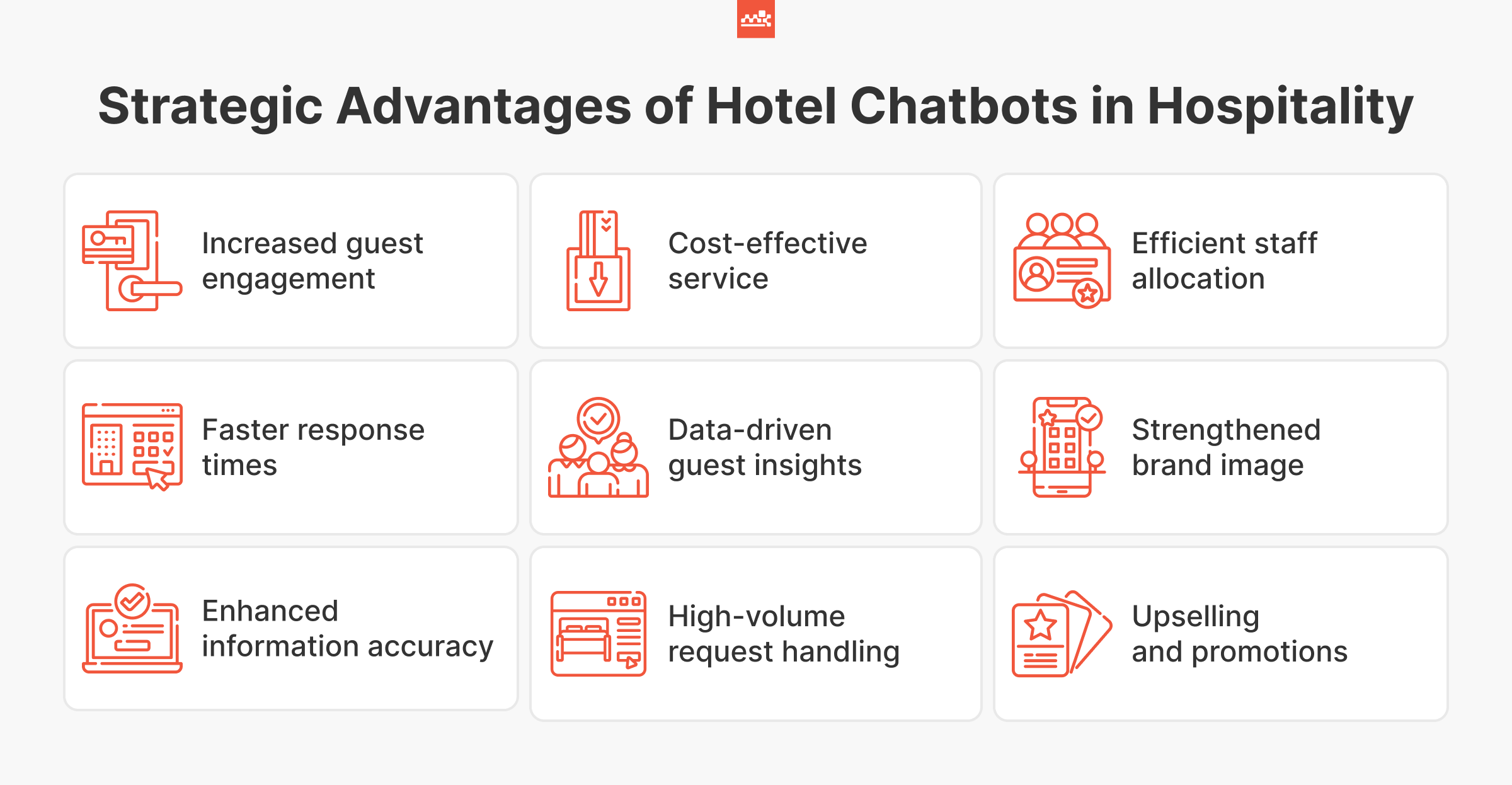
- Ability to handle high volumes of simultaneous requests. The tools efficiently manage multiple dialogues, maintaining service quality during peak times. Their capacity ensures uninterrupted aid even with substantial visitor traffic.
- Improved staff allocation and task prioritization. The solutions address routine inquiries, allowing employees to focus on specialized tasks. This improves workforce efficiency and facilitates exceptional service standards for guests.
- Strengthened brand reputation through technological innovation. Adopting travel chatbots demonstrates a commitment to constant advancement. The adoption of new instruments strengthens the hotel’s brand image in the market.
- Facilitated upselling and promotional activities. Bots effectively communicate offers, enhancing revenue opportunities. They seamlessly integrate promotions into guest interactions, boosting sales rates.
While the advantages of chatbots in the hospitality industry are clear, it’s equally important to consider the flip side. Next, we will navigate through the potential challenges and limitations inherent in this technology, offering a balanced perspective.
The Other Side: Addressing the Limitations of AI Chatbot for Hotels
The deployment of AI assistants in the sector brings its own set of challenges. For hospitality enterprises to stay ahead of the curve it’s paramount to acknowledge and address the following:
- Measuring ROI and effectiveness. Determining the financial impact and productivity of hotel chatbots is complex. It’s essential to analyze factors like cost savings, efficiency gains, and improvements in customer satisfaction. This nuanced analysis is critical for understanding the true value of the tool implementation.
- Data privacy and security. Information breaches are increasingly common, so safeguarding guests is of utmost importance. Companies must navigate the complexities of various data protection laws. It’s vital to implement robust security measures to ensure chatbot compliance.
- User acceptance and trust. Convincing both visitors and staff to embrace AI chatbots in hotels is a significant hurdle. Overcoming skepticism about the reliability of these solutions is key to their successful adoption.
- Integration and scalability. Integrating bots into existing systems and scaling them for strategic growth poses technical challenges. Ensuring compatibility with diverse platforms and adapting to changing business needs is crucial for further expansion.
To address all these business challenges it’s vital to partner with an experienced service provider with a proven track record of successfully delivering projects in the field. Master of Code Global specializes in custom AI chatbot development for the hospitality industry. Our services range from initial consulting to fine-tuning and optimization, ensuring quality maintenance at every stage. We focus on creating user-friendly and efficient solutions tailored to each hotel’s unique demands.
At MOCG, we also understand the complexities of integrating chatbots into business operations. Our approach involves ensuring seamless compatibility with existing systems and scalability for future growth. We prioritize the creation of reliable and secure tools, instilling confidence in both staff and guests.
To aid businesses in evaluating bot investments, we’ve developed the Chatbot ROI Calculator. This tool projects conceivable savings by comparing current operational costs against anticipated AI efficiencies. It’s an effective instrument for understanding the financial implications of AI adoption.
Core Use Cases of Hospitality Chatbots
As we navigate through the intricacies and challenges of AI assistant implementation, it becomes crucial to see these technologies in action. The true potential and effectiveness of the solutions are best understood through practical applications. In the next section, we will delve into various use cases of AI chatbots for hotels.
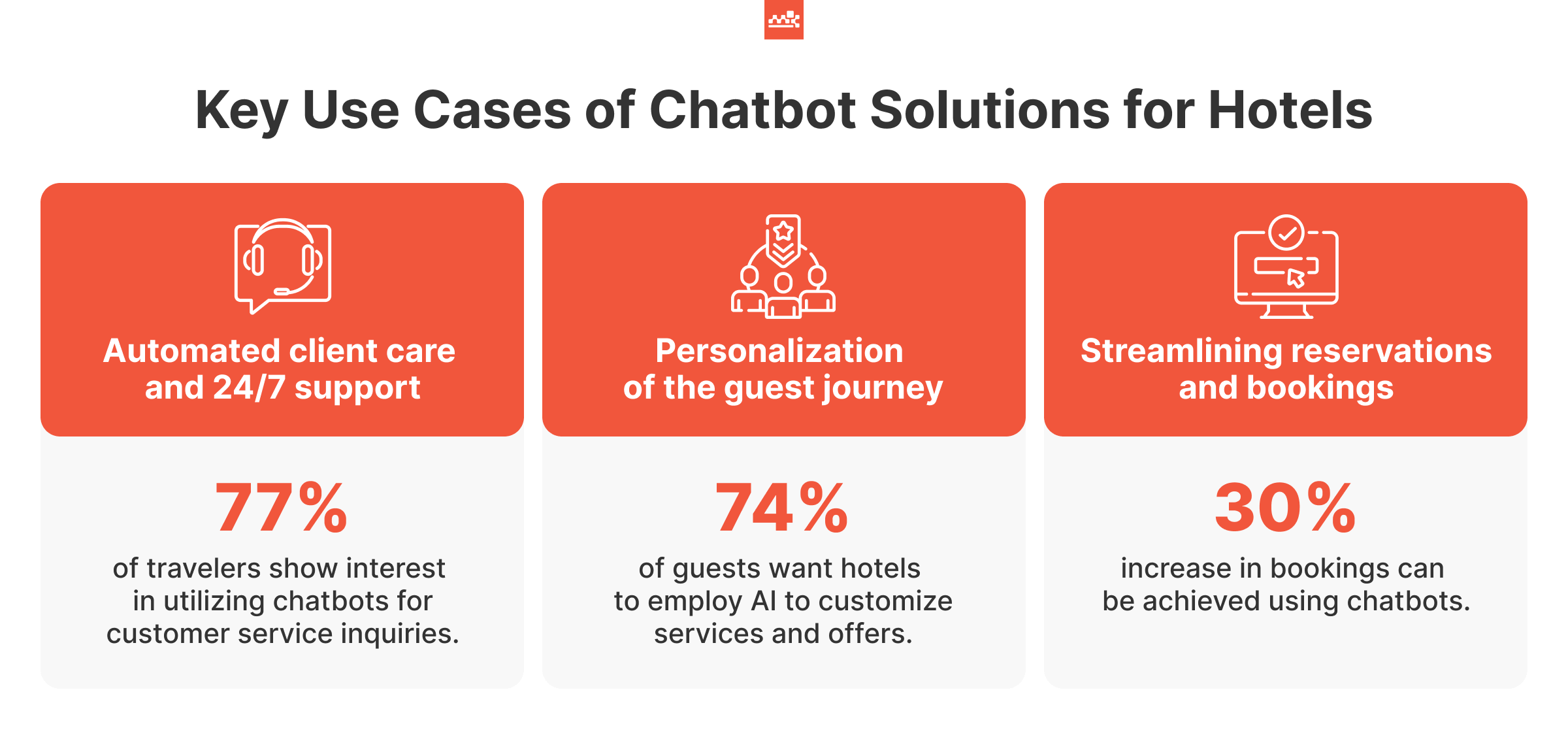
Automated Client Care and 24/7 Support
Customer service chatbots in hotels are revolutionizing guest interactions. They provide seamless 24/7 assistance, addressing inquiries at any hour. Such automation ensures guests receive prompt aid, enhancing their overall experience. A significant 77% of travelers show interest in using bots for their requests, indicating strong support for this technology.
Moreover, these hotel chatbots include language translation features. This capability breaks down barriers, offering personalized help to a diverse client base. The tools also play a key role in providing streamlined, contactless services that travelers prefer for check-in 53.6% and check-out 49.1%. The data highlights the value of AI assistants in modernizing guest communication channels.
Personalization of the Guest Journey
Hospitality chatbots excel in turning each client’s stay into a one-of-a-kind adventure. They tailor services like room selection and dining preferences. The customization enhances each visitor’s experience, making it unique and memorable. A notable 74% of travelers are interested in hotels using AI to better personalize offers, such as adjusted pricing or tailored food suggestions with discounts.
These tools also simplify event and activity scheduling. Guests can easily plan their stay, from spa appointments to dining reservations. Such a streamlined process not only saves time but also reflects a hotel’s commitment to client convenience. The integration of such AI-driven personalization signifies a new era in guest service, where each interaction is carefully modified to individual tastes and needs.
Streamlining Reservations and Direct Bookings
Hotel booking chatbots significantly enhance the arrangement process, offering an efficient experience. Research indicates that bots can boost direct reservations by up to 30%. This enhancement reflects a major leap in operational efficiency and customer support.
In addition, these digital assistants are adept at cross-selling and upselling. They intelligently suggest additional amenities and upgrades, increasing revenue potential. The strategy drives sales and customizes the booking journey with well-tailored recommendations.
Furthermore, hotel reservation chatbots are key in delivering personalized experiences, from room selection to special service offers. Such customization leads to more satisfying interactions and reservations. AI solutions mark a shift in hospitality, providing an intuitive and seamless process that benefits both sides.
Handling Routine Queries and FAQs
Chatbot solutions for hotels are adept at managing frequently raised queries. They autonomously handle 60-80% of common questions, enhancing operational efficiency. The automation allows staff to concentrate on more intricate tasks and deliver personalized service.
These tools also provide critical support with emergency information and assistance. Bots offer instant guidance on security procedures and crisis contacts, ensuring visitor safety. This capability streamlines guest service and reinforces the hotel’s commitment to clients’ welfare.
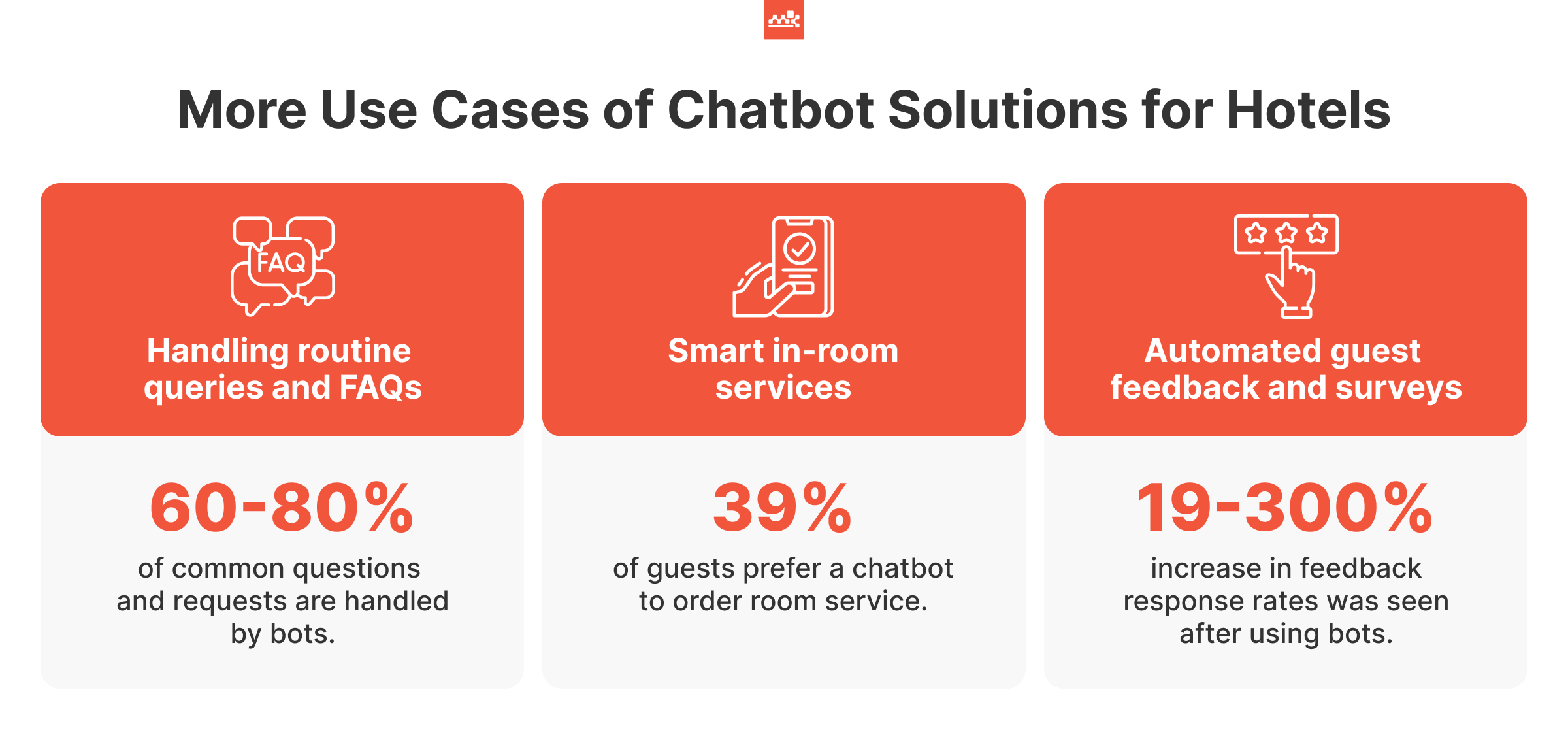
Smart In-Room Services
AI chatbots for hotels are redefining the in-room guest experience. They allow travelers to manage space features and amenities with ease. Such innovations cater to 73% of customers who prefer self-service options for reduced staff interaction.
Moreover, these digital assistants make room service ordering more convenient. Nearly 39% of visitors choose to order meals via phone or chatbot. This trend shows a shift towards seamless, autonomous dining experiences. Thus, bots not only elevate comfort but also align with contemporary hospitality demands.
Automated Guest Feedback and Surveys
Integrating hotel chatbots for reviews collection has led to a notable rise in response rates. Some businesses saw increases from 19% to as much as 300%. This significant uptick indicates the effectiveness of bots in engaging guests for their insights. The ease and interactivity of the digital assistants encourage more customers to share valuable reviews.
Additionally, these solutions are instrumental in gathering and analyzing data. They efficiently process user responses, providing critical discoveries for hotel management. Such capability allows for strategic improvements, catering to guest preferences more effectively. Chatbots in this role enhance the quality and utility of information assessment in the hospitality sector.
3 Success Stories of Chatbot Solutions for Hotels
After delving into the diverse use cases, it’s fascinating to see the solutions in action. To give you a clearer picture, let’s transition from theory to practice with some vivid hotel chatbot examples. These implementations show the practical benefits and innovative strides made in the industry.
Thon Hotels’ FAQ Assistant
Thon Hotels introduced a front-page chatbot to enhance customer service and streamline guest queries. This assistant offers real-time solutions, handling common inquiries efficiently. It’s designed to save time, allowing staff to focus on complex questions and improving overall client support.
The bot’s success led to a noticeable reduction in phone calls and emails. The hotels’ commitment to technology provides guests with instant online assistance, directly from the website. The initiative reflects the business’s innovative approach to offering a modern, responsive customer experience.
Marriott International’s AI-Powered Chatbots
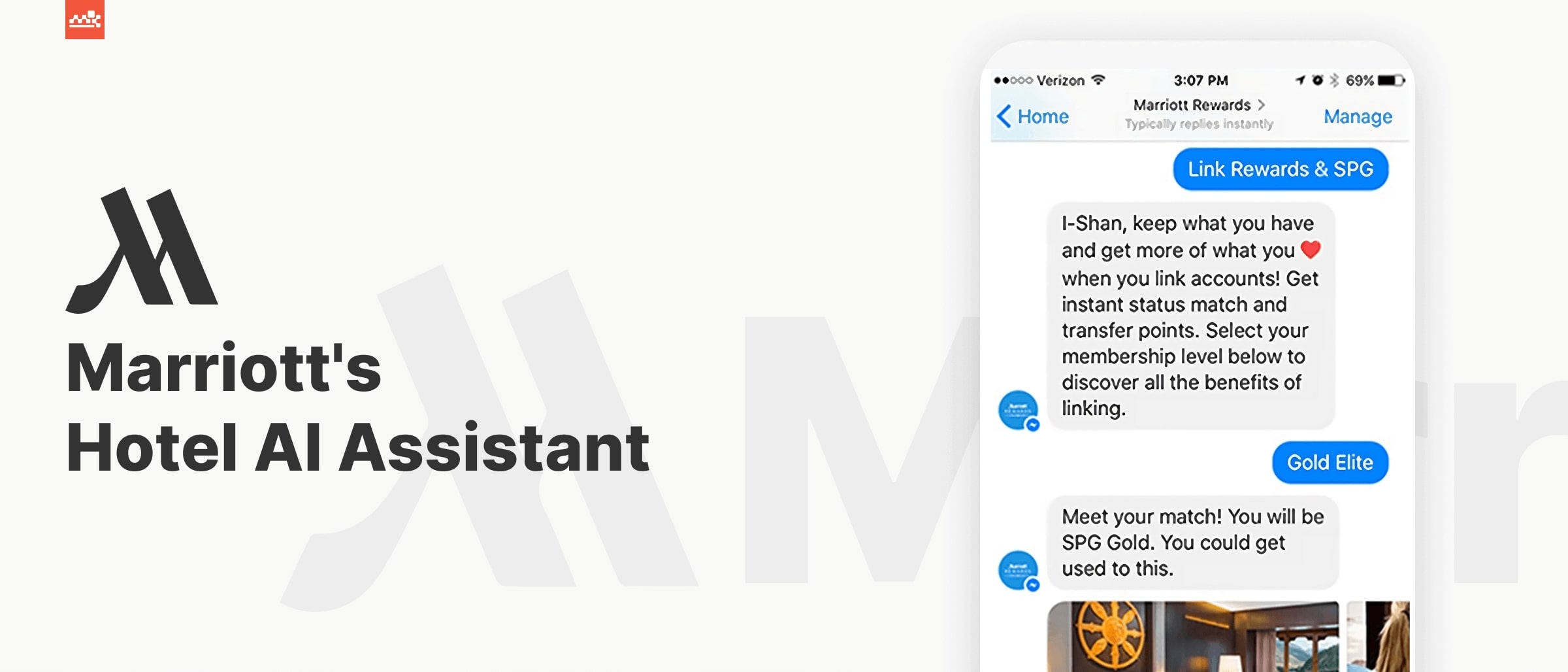
At Marriott, AI isn’t just a tool, it’s part of the guest experience. They use it to understand and predict visitor preferences, making stays uniquely personal. This approach brings a blend of tech innovation and the brand’s signature hospitality.
Transitioning from data analytics to direct interaction, Marriott’s hotel chatbots, accessible on Slack and Facebook Messenger, offer seamless client care. These AI assistants efficiently handle queries and provide tailored recommendations. It’s a strategic move by the hotel, showing its commitment to integrating cutting-edge technology with guest-centric service.
Choice Hotels International’s Use of AI
Choice Hotels harnesses a chatbot for round-the-clock guest service. Their bot multitasks, slashing wait times by handling several requests at once. This efficiency boosts traveler satisfaction remarkably.
The company’s AI assistant also automates booking processes and cancellations effortlessly. The tool saves valuable time, enhancing guests’ comfort and luxury experience. Such a smart solution allows staff to focus on vital operations.
Further expanding its AI application, the hotel uses this technology to understand and act on customer preferences. Through AI, they send personalized offers and discount codes, targeting guest interests accurately. The approach personalizes the consumer journey and optimizes pricing strategies, improving revenue management. Thus, AI integration reflects a strategic blend of guest service enhancement and business optimization.
Shaping the Future: Hotel Chatbots Emerging Trends
The trajectory of AI chatbot technology in hospitality is on a steep upward curve. Within the next three years, 78% of hoteliers anticipate boosting their tech investments. The trend reflects a commitment to evolving guest services through advanced solutions.

AI chatbots for hotels are central to this technological evolution. In fact, 54% of hotel owners prioritize adopting instruments that improve or replace traditional front desk interactions by 2025. Such a shift towards AI-driven operations underscores the transition to more efficient, client-centric strategies.
Oracle and Skift’s survey further reveals a consensus on contactless services. Over 60% of executives see a fully automated hotel experience as a likely adoption in the next three years. This includes check-in/out processes, food and beverage, and room access, all facilitated by AI assistants.
The future also points towards personalized guest experiences using AI and analytics. According to executives, 51.5% plan to use the technology for tailored marketing and offers. 48.3% of them aim to leverage it for customer service enhancements. Additionally, 30.2% intend to integrate travelers’ personal data across their entire trip, indicating a trend towards highly customized client journeys.
These emerging directions in AI chatbots for hotels reflect the industry’s forward-looking stance. They also highlight the growing importance of artificial intelligence shaping the tomorrow of visitors’ interactions.
Wrapping Up
In the hospitality sector, hotel chatbots have proven to be game-changers. They streamline operations and elevate guest experiences significantly. The impact of AI assistants on hotel management is also profound. These tools personalize services, boost efficiency, and ensure round-the-clock support.
As the industry progresses, bots will continue to drive innovation and customer satisfaction. Are you ready for AI chatbot integration to upgrade your service quality and gain a competitive edge?
Discover how Master of Code Global can help enhance your guests’ experience and boost sales growth.

